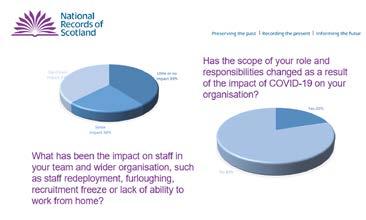
19 minute read
The impact of the COVID-19 health crisis on recordkeeping in the Scottish public sector
The impact of the COVID-19 health crisis on recordkeeping in the Scottish public sector[1]
By Gillian Mapstone
Advertisement
As the world was turned upside down in spring 2020, the impact of the COVID-19 pandemic saw transformational changes in workplaces across the world, with the move to remote home working for all but essential key workers. Little did we anticipate that, over a year later, this disruption would still be in place for many, and that the ‘temporary crisis’ response changes to working cultures would become the new way of working.
During the spring and autumn of 2020, the National Records of Scotland (NRS) conducted two pulse surveys, to measure and understand the disruption and the impact of the pandemic on the recordkeeping community in Scotland. Alongside a discussion webinar event in the summer, the surveys provided valuable insight and metrics about the initial impact of the pandemic, and the longer-term implications for the sector.[2]
Recordkeeping in Scotland
The Public Records (Scotland) Act 2011[3] (PRSA) requires all scheduled public authorities in Scotland to prepare a records management plan (RMP), setting out proper arrangements for the management of the authority’s public records; submit this plan to the Keeper of the Records of Scotland for agreement; and ensure the implementation of the agreed plan.[4] Since its enactment in 2013, the PRSA implementation team at the NRS has assessed and approved over 260 RMPs, which evidence the policies and procedures for the creation, security, management and preservation of public records. The PRSA stakeholder community includes recordkeeping professionals representing the breadth of the Scottish public sector, including health authorities; policing and justice organisations; the culture, leisure and tourism sectors; and both central and local government.[5]
1. This report benefited from the contribution of colleagues across the NRS. With grateful thanks to Garth Stewart and Lynn Bruce from our Digital Records Team; Laura Gould, Archive Depositor Liaison Branch; and Hugh Hagan and Andrea Wells, The Public Records Scotland Act Implementation Team. 2. The surveys were sent directly to the PRSA key contacts, the named individuals with operational responsibility for the implementation of the RMP in a named Scottish Public Authority, covered by Schedule 1 of the Public Records (Scotland) Act 2011. Additionally, members of the PRSA Knowledge Hub forum, which includes independent records management consultants, were invited to participate. NRS Impact of COVID-19 on Recordkeeping in Scotland Survey Spring, April 2020, 71 responses; NRS Impact of COVID-19 on Recordkeeping in Scotland Survey Autumn, October 2020, 55 responses. The NRS and the Scottish Council on Archives (SCA) hosted a webinar to further explore the issues raised in the spring survey around capturing records of enduring value, and data from this event have also been used throughout this article. Documenting COVID-19 – Capturing History as It Happens Webinar, 24 August 2020. 46 people attended the webinar. 3 .<www.nrscotland.gov.uk/files/record-keeping/public-records-act/PublicRecordsScotlandActPublished.pdf>. 4. Public Records (Scotland) Act 2011, s1 (1). 5. <https://www.nrscotland.gov.uk/files/record-keeping/public-records-act/PublicRecordsScotlandActPublished.pdf> Schedule (Introduced by Section 2 (1)).
Since the creation of a statutory requirement to address records management (RM) in the public sector in Scotland, great progress and improvement has been made. All scheduled authorities now have a named individual at the highest level of their organisation with strategic responsibility for their RM.[6] All authorities also have named individuals in the organisation who have operational responsibility for compliance with the agreed plan.[7] This senior commitment and highlevel accountability has increased the visibility and importance of record management across the public sector since 2013.[8]
The development and implementation of the keeper’s model plan, setting out 15 elements which authorities have to address in their RMP, further underpins improved recordkeeping through the requirement to address such functions as retention schedules; information security, records transfer and disposition; and, importantly, the extension of such provisions to any third-party organisation conducting functions on behalf of the authority.[9] Moreover, engagement between the NRS and the PRSA stakeholder community, since 2011, has seen the development of a dynamic network of records and information professionals across the public sector, who connect at the triennial PRSA conference, or the regular PRSA surgeries and events held every year, to discuss and explore challenges and developments. Prior to 2011, recordkeeping in the Scottish public sector was neglected and in poor health. However, the commitment by authorities, supported by the NRS, over the last decade, had seen marked improvement and progress in Scottish public sector recordkeeping practice and development.
And then the pandemic struck.
Understanding the impact
One of the key aims of the surveys was to establish, what, if any, impact of the disruption caused by the changes brought on by the pandemic had been, for our recordkeeping colleagues across Scotland. The responses gave us some clear messages about the health and wellbeing of the sector and the challenges it was facing.
Significant reduction in RM resource and substantial changes to roles and responsibilities
In Scotland, as across the UK, much of the public sector rapidly pivoted to reprioritise and focus resources on tackling the front line COVID-19 response.
6. Public Records (Scotland) Act s1 (2)(a)(i). 7. Public Records (Scotland) Act s1 (2)(a)(ii). 8. ’The Public Records Scotland Act’ presentation by Robert Fotheringham, NRS, to the IRMS Annual Conference, 21 May 2019. PRSA survey 2019: 83% of respondents agreed PRSA had increased organisational commitment and buy-in to the improvement of records management. 9. Model Records Management Plan <www.nrscotland.gov.uk/record-keeping/publicrecords-scotland-act-2011/resources/model-records-management-plan>.
Graphical display of responses to questions in the NRS Impact of COVID on Recordkeeping in Scotland, Spring 2020
The spring survey reported that 20% of respondents had adjustments made to their roles and responsibilities, to support the delivery of key services within their organisations. Alongside the impact of caring responsibilities, staff isolation and initial communication limitations, this led to a significant reduction in capacity across the community.[10] By the autumn survey, this figure had significantly increased: the continued adjustments and reprioritisation of the Scottish public sector was now being acutely felt by one-third of respondents.[11] Redeployment, furlough and recruitment freezes all made their presence felt, along with continued and prolonged role adjustments, significant alterations and additions to existing roles and job descriptions, as a direct result of the pandemic.
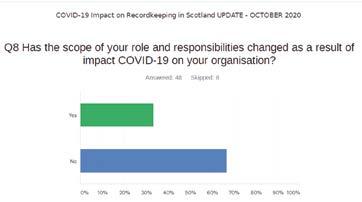
Response graph from NRS Impact on Recordkeeping in Scotland Survey, Autumn 2020
Although nearly half of such changes involved additional information governance (IG) activities, such as IG policy development to support remote working and increased data protection impact assessments, over half of these changes were to include ‘non-IG’ activities, including staff welfare support, health and safety, logistics and distribution, and the development of COVID-secure workplaces.
It is clear from both surveys that the pandemic has put a squeeze on the limited RM resource across the Scottish public sector and has led to a medium-term diversification of job responsibilities, in turn, leading to a dilution of focus on RM activities.
A continued widespread cessation of records and information management development work
The impact of reprioritisation, to support the front-line COVID-19 response, meant that 81% of respondents noted moderate to significant derailment of planned RM development initiatives, or the cessation of continuous improvement programmes[12] Narrative responses identified an anxiety from colleagues that some of the very positive steps made across the sector, since the introduction of PRSA in 2013, may be undone by the disruption of this pandemic.
The move to remote working, and the need to access reliable information, saw an increased importance and visibility of recordkeeping in the spring of 2020. The RM business continuity planning, a feature of the PRSA model plan, stood up to the demands of this unforeseen disruption: 95% of respondents reported the success of their plans to support dispersed working.[13]
The right records in the right place at the right time
Agile and robust recordkeeping has been demonstrably critical to the success of remote-working arrangements and supports the swift public sector response to the pandemic. Both surveys enquired as to the perceived importance of RM in supporting the public sector response to the crisis. In the spring, RM was seen as being moderately important, but by the autumn responses indicated an upward trend in the perception of the role of RM in supporting the authority’s COVID-19 response.[14] Although there is a recognition that the priority is dealing with the urgent health emergency, there is a reported sense of increased visibility of the essential asset of information. Access to reliable, accessible, digital information has been fundamental to supporting business agility during this period of crisis.
12. Impact of COVID-19 on Recordkeeping in Scotland Survey Autumn, October 2020: narrative responses Q7: What has been the impact of the last 6 months, working arrangements on your planned programme of work? 19% noted no significant change; 81% reported moderate or significant changes, which included putting plans on hold to abandoning work plans entirely. 13. Impact of COVID-19 on Recordkeeping in Scotland Survey Autumn, October 2020: narrative responses Q14: How have your business continuity arrangements withstood the impact of COVID-19.14. Responses to Q9: How important has the records management service you provide been to supporting disrupted working arrangements and business continuity? Impact of COVID-19 on Recordkeeping in Scotland Survey Spring, April 2020 (58/100 score) and Impact of COVID-19 on Recordkeeping in Scotland Survey Autumn, October 2020 (67/100 score).
Challenges and opportunities
Beyond understanding the immediate transformational impact on the sector, the survey and webinar also captured a number of opportunities and challenges for the community, arising from changes brought about by the pandemic.[15]
A swift move to digital recordkeeping
The near overnight transformation of the public sector recordkeeping landscape brought about accelerated change in the roll out of digital recordkeeping practice across the board.
Prior to March 2020, 48% of services who participated in the survey operated paper or hybrid recordkeeping arrangements, with aspirations to embrace digital recordkeeping. The transition to digital working was aspirational and not an organisational priority.[16] The need to quickly support digital service delivery and working from home accelerated the importance and prioritisation of such changes.
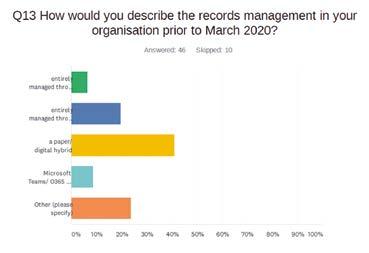
Screen grab form Impact of Covid on Recordkeeping in Scotland Survey, Autumn 2020
15. Impact of COVID-19 on Recordkeeping in Scotland Survey Spring, April 2020: Q11: Do you view the impact of COVID-19 arrangements on your records management as a challenge, threat, opportunity or all of the above? Challenge: 25%: opportunity: 32%: threat 5%: 38%. 16. Impact of COVID on Recordkeeping in Scotland Survey Spring, April 2020: Q12: How would you describe records management in your organisation? A paper/digital hybrid: 48%: ERDM 7%: shared network drives 16%: other 28%.
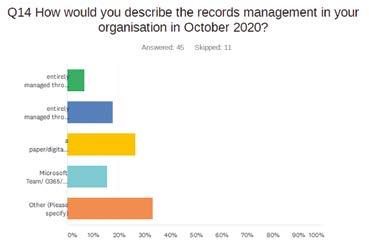
Screen grab form Impact of Covid on Recordkeeping in Scotland Survey, Autumn 2020
By the autumn survey, 50% of respondents had changed their RM arrangements as a result of the pandemic: notably, by this time, we see the complete move away from hybrid systems and paper records, to embrace fully digital solutions and web-based service delivery models.[17] 41% of respondents told us that the method of public records creation had also changed by the impact of changed working practices, most significantly, with the roll out of Office 365, SharePoint, Teams and One Drive.[18] The move to born-digital record creation and management had been essential to supporting working from home, and this is a welcome development for the sector. This beneficial progression, however, also came with some genuine concerns, which will prove challenging over the immediate medium and longer term. Whilst the transition to digital working is welcomed, there were a significant number of concerns raised by the surveys and the webinar, as to the lack of control colleagues had over such a significant infrastructure change. They had little influence over the planning and management of the changes. Their expertise and knowledge were sacrificed in favour of rollout speed, to deal with the sudden impact and changes necessitated by the pandemic: “uncontrolled + unmanaged + unstructured data = unsafe data” one comment told us.[19]
17. Impact of COVID-19 on Recordkeeping in Scotland Survey Autumn, October 2020: Q14: How would you describe records management in your organisation? A paper/digital hybrid: 26%; ERDM 7%; shared network drives 18%: MS Teams/Office 365/SharePoint 16%: other 33%. 18. Impact of COVID-19 on Recordkeeping in Scotland Survey Autumn, October 2020: Q12: Has your organisation’s record creation changed as a result of working from home: Yes: 41%: no: 59%. 19. Impact of COVID-19 on Recordkeeping in Scotland Survey Autumn, October 2020: Q12: narrative response.
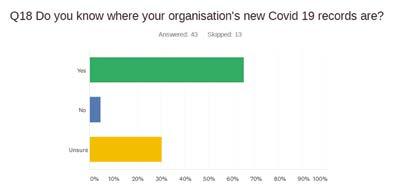
Screen grab form Impact of Covid on Recordkeeping in Scotland Survey, Autumn 2020
Data gathered during the Documents Covid - Gathering History as it happens webinar, August 2020
Concern amongst recordkeepers includes that the unplanned data sprawl and creation of public records, with inadequate governance and security, has seen a proliferation of records created outside the authority recordkeeping systems. Just over one-third of respondents, in the autumn survey, confirmed they were not always certain that they could locate information in the new digital systems rolled out at pace.[20] Significant work will be required over coming months and years to re-establish holistic business classification schemes and embed rigour and security across all these new information spaces.
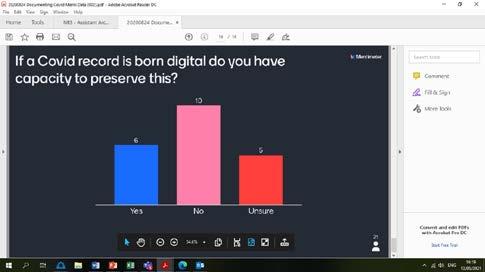
New public functions and new public records, which require proper management
38% of survey respondents shared that their organisation was undertaking new activities as a result of COVID-19, and, as a by-product, creating new record types not currently covered by business classification schemes, or retention and disposal schedules.21 Interestingly, 25% reported the use of new technologies and media for the creation and management of records.22 As we endured lockdown, many Scottish public authorities moved their face-to-face service delivery online, with the creation of new and broader websites now delivering more and more public functions.
Securing records of enduring value
As we lived through emerging history, there was concern to ensure the capture of public records and historical documentation of Scotland’s COVID-19 response. In the spring survey, 100% of respondents had not formally considered or adapted their retention and disposal schedules to ensure the capture and preservation of COVID-19 records of significant importance for archival purposes.23
As the year progressed, however, following a webinar on this event, the autumn survey recorded nearly two-thirds of respondents were currently reviewing, or preparing to review, their existing retention policies to capture this important emerging history.24 Additionally, 57% had been actively collecting material relating to their COVID-19 response.25 Notably, the NHS bodies in Scotland were acting collectively to harness their response to a global health crisis, and ensure records relating to COVID-19 are identified and preserved.
At the NRS, we recognised in early spring 2020 the need to adapt our own collecting policies in relation to COVID-19. As the archive for so many public authorities, colleagues were looking to the NRS for guidance and support to ensure the historical challenge could be addressed.
The NRS collects the archival records of Scotland’s national public authorities, criminal and civil courts, as well as many private bodies. These records are in a variety of media and formats, and each year about 1 km of records are usually added to our collections.
21. Impact of COVID-19 on Recordkeeping in Scotland Survey Autumn, October 2020 Q17: As a result of COVID-19 has your organisation delivered new functions and created new types of records? Narrative responses included details of new functions and records, including track-and-trace documentation, COVID-19 testing records, new HR records, disbursement of business support grants, crisis support services, new boards and committees in the organisation, and humanitarian response. 22. Impact of COVID-19 on Recordkeeping in Scotland Survey Autumn, October 2020, Q19: What new media are you using to create these records? Narrative responses included WhatsApp, Trello, Streas, Nearme, Kaizala,; and YouTube. 23. Impact of COVID-19 on Recordkeeping in Scotland Survey Spring, April 2020 Q15: As we are living through emerging history, what changes if any have you made to your retention and disposal plans? 24. Impact of COVID-19 on Recordkeeping in Scotland Survey Autumn, October 2020 Q20: As we are living through emerging history, what changes if any have you made to your retention and disposal plans? 25Impact of COVID-19 on Recordkeeping in Scotland Survey Autumn, October 2020 Q24: Has your organisation been actively collecting material relating to COVID-19? Yes: 57%: no: 43%.
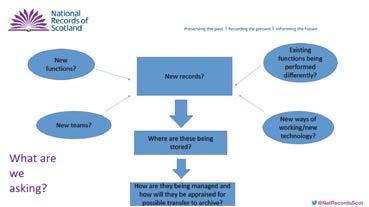
NRS advice to record creators: Slide from Preservation by Laura Gould, NRS Client Manager at Documenting Covid – Capturing History as it happens Webinar, August 2020.
In 2020, our teams within Archive Depositor Liaison (our archive service ‘front-end’ for depositors) were busy finding out about the effect of COVID-19 on the functions and services of our depositors: how this would affect the types of records created, and ultimately the shape of our future national archive. The Government Records Collecting Policy was explicitly updated to include COVID-19 records to ensure that Scotland’s response to the pandemic is preserved for future generations.
Additionally, understanding the changing nature of public service citizen interaction, brought on by the pandemic, we swiftly moved to increase our work in the NRS Web Archive.
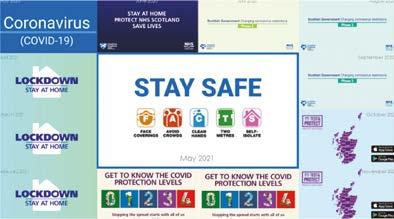
The NRS Web Continuity Service (WCS) enables the NRS to capture, preserve and make available archival snapshots of our depositors’ (clients’) websites in the NRS Web Archive.26 The keeper recognises that public authority websites are public records, and therefore, must be a key part of his statutory collecting duty.27 Collecting these important records not only supports public access to historical official information, but it creates cost savings for clients.
Launched in 2017, we have so far captured archival snapshots of 227 websites, belonging to 108 website owners.
In May 2020, the NRS launched our COVID-19 web archive and dramatically increased our collecting operations, in a bid to capture, preserve and make available, a representative web archive of content relating to the effects of the pandemic in Scotland.
Prior to the pandemic, we had collected 230 snapshots per annum; through the efforts of the COVID-19 web archive team, we have been able to add over 3000 new snapshots to the web archive in the last 12 months, and this collecting effort continues as the effects of the pandemic ebb and flow.
As public bodies utilised social media to communicate directly with the citizen, the NRS also began social media archiving: a watershed for the NRS. Since October 2020, we have collected COVID-19-related content, from 10 official Twitter accounts, including the Scottish Government, Public Health Scotland, and Scotland’s Supreme Courts. We are able to precisely and safely capture this content via Social Feed Manager,28 which is provided to us as a service by Internet Archive. Through these efforts, we hope to collate new digital historical assets for Scotland, which will be used by future generations to assess, scrutinise and understand this extraordinary period in our nation’s history.
In 2021, our focus remains on continued engagement with our depositors. As lockdown eases, we want to ensure that the records we collect for permanent preservation reflect the continuing changes to life in Scotland.
What lies ahead?
When we launched our first survey in spring 2020, like most people, we could not have anticipated the duration and depth of disruption of the COVID-19 health crisis, and how this would affect record creation management and archiving. As I write this in late spring 2021, we are beginning to see the gradual unlocking of communities, businesses and services, and with the roll out of the vaccination programme, we hope that this year will see an end to the crisis response period we have been living through. It is clear, however, that these past 15 months have been transformational for the recordkeeping community in the Scottish public sector. Future working models look markedly different to pre-pandemic arrangements, and some of the changes that have taken place will undoubtedly be here o stay, as we begin to look to a postpandemic future.
At the NRS, we need to continue to engage with our recordkeeping community, and our archive depositors, to continue to monitor and understand the challenges and opportunities of the short-, medium- and longer-term impacts of this crisis, on our sector.
There are undoubtedly challenges, as outlined here, around future resourcing, digital issues, and the re-establishment of authority and control on many uncontrolled recordkeeping environments. Particularly in the public sector, the coming years will be challenging, as we face the economic consequences of this health crisis. The keeper will be particularly keen to learn from colleagues whether the medium-term diversification of duties recedes entirely or if ‘temporary’ COVID-19 tasks become routine. He will also want to better understand the impact digital transformation is having on pre-pandemic agreed RMPs.
Our recordkeeping community has taken a significant knock during the past 12 months, and will need some nursing from practitioners, and support from sector leaders, to transition back to pre-pandemic strength. It is clear, however, that, challenges aside, this experience also offers us an opportunity to raise the profile of records and information management. 54% of colleagues who participated in the first survey felt that the crisis offered this opportunity. Good recordkeeping has proven to be vital in supporting the home-working model; it has allowed us to continue to meet our statutory obligations under the most chaotic circumstances and it has been central to the development of future work planning.
In Scotland, we are particularly well placed to meet the challenges head on. The progress we have been able to make as a profession under PRSA is key to the future. The collaboration and co-working that over the past 10 years has become our trademark provides us with a healthy foundation from which to take advantage of new ways of working. Under the keeper’s direction, and using the powerful networking resource we have cultivated, we will share experiences and further develop our knowledge and skills. More importantly, together, we will ensure that we remain committed, whatever the challenges, to protecting the rights of Scotland’s citizens by safeguarding the records we create on their behalf.
The Author
Gillian Mapstone is Head of Records and Archives Engagement at the National Records of Scotland. She leads the services which engage with recordkeeping bodies across Scotland, in both the public and private sector, to support and develop records and archive services nationally. A registered archivist, Gill has over 20 years of diverse experience in the sector, which include roles as the NRS’ first corporate records manager, overseeing a national records review of a major Scottish public body, and as committee and panel member of the UK Archive Service Accreditation Scheme. Chair of the Archives and Records Association (Scotland), Gill is passionate about communicating the central importance of good recordkeeping to underpin accountability, democracy and identity.
<Gillian.Mapstone@nrscotland.gov. uk> <www.nrscotland.gov.uk>




